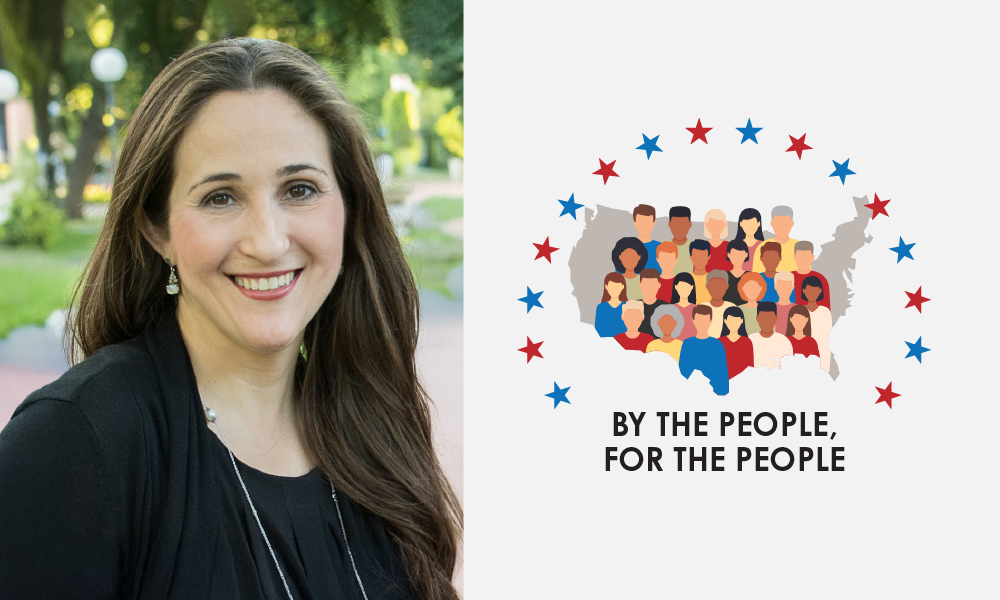By Buddy Chung,Christian Hetrick
Copyright usc

The United States is one of history’s most enduring democracies, but the U.S. democratic system is now under strain. Reduced public trust, low overall levels of voter turnout and increased polarization have put America at risk of becoming a democracy in name only.
A new initiative, co-led by a professor from the USC Price School of Public Policy, seeks to help fix the system. Mindy Romero, Director of the Center for Inclusive Democracy, is among those spearheading By the People, for the People, a nationwide initiative that aims to rebuild trust in U.S. democracy. Ultimately, the campaign plans to convene a national “People’s Assembly” in Washington, D.C., where citizens from each state would produce a roadmap of reforms to our democratic system.
We caught up with Romero, who is co-leading the effort along with Scott Warren of Johns Hopkins University’s SNH Agora Institute, to discuss the initiative and the challenges facing U.S. democracy. Her answers were lightly edited for length and clarity.
How sick is our democracy today?
Unfortunately, it’s pretty sick by multiple measures. Most scholars and organizations that track the health of democracies around the world put ours at the stage of being in peril.
I would argue that this has been happening for quite a long time. It isn’t about the last few years or even the last decade, and it’s not about one party or another. We have had a democratic constitutional republic that has endured, indeed we are the oldest democracy, but it really hasn’t performed and produced the outcomes in terms of quality of life that most Americans need and want, as a representative democracy should.
Our democratic system functions in a way that discourages people from participating, particularly for historically underrepresented groups. Americans struggle to see how their participation matters – for instance some feeling that their vote really doesn’t make a difference in a system that does not serve them.
Why is it important to fix our democracy?
Because it’s about the alternatives, right? We need to do much to fix our democracy and reform it and reimagine it. But if we give up and let things continue to devolve, we’re looking at the potential of authoritarianism, totalitarianism, you name it.
We have much research to tell us that democracies, even though not perfect, give the best potential opportunities for their people, whereas other types of regimes do not. My concern is a nation that backslides or moves towards not being a democracy – moving towards possibly an authoritarian regime, for instance – we may not have the muscle memory, if you will, to be able to fix it and successfully move back to a democracy in the future.
Tell us about the idea for a People’s Assembly. How would it work?
It is a national People’s Assembly that is part of an overarching, five-year plus plan. First, we will conduct state-by-state public civics campaigns that are all about rebuilding our awareness of democratic norms and how government functions. That will help build a network of support and participation to make the People’s Assembly possible. State coalitions, which will be comprised of a broad spectrum of civil society groups and individuals, will choose delegates who are representative of a states’ populations and people.
They convene in D.C. They work together, we think, for at least a year. But once they form a body, the People’s Assembly delegates are in charge, and they decide how much time they need and what they are working towards. The idea is that they’re going to produce a democracy roadmap, a comprehensive roadmap, looking at what reforms, what actions are needed to reimagine our democracy in a direction that produces better outcomes for the American people.
What are some reforms the People’s Assembly could look at?
I should just make it clear that it is going to be the American people who call the shots. It’s ‘By the People, for the People.’ This is not driven by a set of academics or people with political motives that take us down typical pathways. This initiative is people centric. The idea is that the American people will only see reforms for a reimagined democracy as legitimate if they come from the American people themselves.
What we will do is to strongly encourage the People’s Assembly delegates to think comprehensively about reforms and to recognize the interconnected nature of our societal institutions and sectors and how they all form the basis of a strong and enduring democracy. To help inform their deliberations, we will make a large number of non-partisan resources available to the delegates.
So some of the reforms could be election reforms. The delegates could be looking at things like big money in politics, which I think across the board, Americans have trouble with. It could be about increasing civics in schools. That’s probably a no-brainer. It could be talking about recommendations for the private sector to better invest and create a culture of civic and political participation. Reforms likely will be at multiple levels – national, state and local.
But I think there are going to be some very significant reforms because it’s about the outcomes. We believe that the American people are disconnected from the political process, disillusioned, skeptical, maybe even angry because they don’t see how our democracy and our government is actually working for them. So we’re asking them: ‘Okay, given this is the case, then think big in terms of what the reforms are that are going to make you want to participate and believe in your democracy.’ The delegates will work together to find common ground for building a representative democracy, through significant reforms, that functions to actually represent the American people better – where the people feel they have at least a fair chance of getting their needs, wants, concerns debated and addressed within their democracy.
How do you get policymakers to take the People’s Assembly seriously?
I should assure everybody that we are under no illusions about the difficulty of our political landscape now. The politics of polarization and just how, at a national level, it’s difficult to get movement on many, many topics, if you think about just the gridlock in Congress.
But the process here will be people first. Overtly political actors are not going to be part of this. It’s the American people and it’s a broad spectrum of civil society groups that are nonpartisan and who are holding their own beliefs but agreeing to come together with a strict set of self-imposed rules to stay focused on the prize of a better democracy and not to devolve into political divisiveness.
Current policymakers are going to be at the other end of this, when the roadmap is released. They’re going to be the ones that communities and the American people are going to be asking to have conversations with, ultimately, to adopt and implement many of these recommendations. So, on a parallel track, we’re going to do civics campaigns leading up to and while the People’s Assembly is happening. We’re going to be having conversations across the country, a huge communications effort that makes sure that all Americans know about this movement, know how to get involved and that everyone involved is fully transparent in every part of it.
In a nutshell, the By the People, for the People initiative provides the infrastructure for the American people and non-partisan civil society organizations to create a movement together, not tied to the election cycle and without partisan identities, to reimagine a better democracy.



